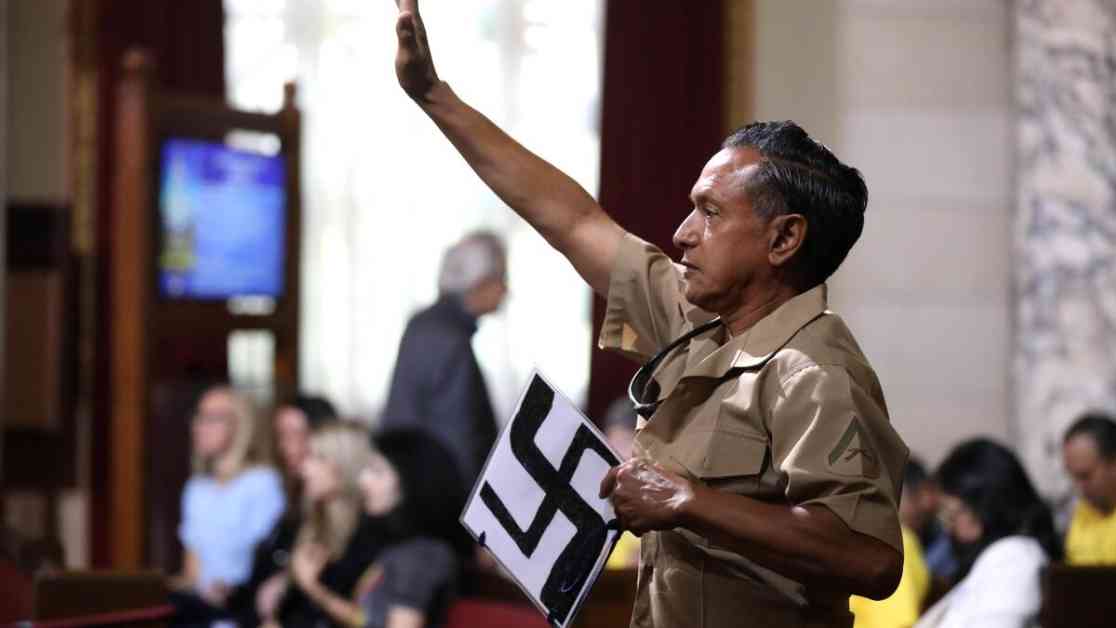In the heart of Los Angeles, the City Council chamber has been a battleground for some of the most hurtful and offensive messages delivered in a public forum. Over the past decade, a handful of individuals have consistently spewed racial slurs, antisemitic remarks, and other forms of verbal abuse towards council members, targeting their appearance, weight, clothing, sexual orientation, and gender. These toxic outbursts have tainted the council’s proceedings on a regular basis, creating an atmosphere of hostility and discomfort.
Taking a stand against such vitriolic language, seven council members made a bold move on Friday by endorsing a proposal to ban just two specific words that have been repeatedly used to insult and demean others. Spearheaded by Council President Marqueece Harris-Dawson, the proposal seeks to prohibit the racial slur known as the N-word and the sexist vulgarity known as the C-word. Audience members who persistently use these words during meetings could face removal or be barred from attending future sessions.
Harris-Dawson, a Black council member, highlighted the negative impact of such language on civic engagement, noting that the pervasive use of these derogatory terms has discouraged people from participating in the council’s meetings, which are held three times a week. He emphasized that these words, which target inherent characteristics of individuals, serve no political purpose and are solely intended to offend and degrade.
While the proposal aims to curb offensive behavior, legal experts have expressed skepticism about its constitutionality. Erwin Chemerinsky, dean of the UC Berkeley School of Law, acknowledged that while the two words in question are deeply offensive, they are protected under the 1st Amendment. However, he suggested that a narrowly tailored ban on such offensive words might withstand legal scrutiny.
On the other hand, Eugene Volokh, professor of law emeritus at UCLA School of Law, and Aaron H. Caplan, a professor at LMU Loyola Law School specializing in the 1st Amendment, raised doubts about the proposal’s viability in the face of potential legal challenges. Caplan pointed out the risk of discriminating against certain viewpoints by singling out a few prohibited words while ignoring other offensive language.
Since assuming the role of council president, Harris-Dawson has been vocal about his commitment to addressing disruptive behavior during meetings. He likened the need for decorum to transitioning the city out of its “Gotham city phase,” referencing the lawless fictional metropolis depicted in Batman comics and movies. His proposal outlines a warning system for offenders, with escalating consequences for repeated violations, including potential exclusion from future meetings.
While only a small number of individuals have consistently engaged in hate speech during public meetings, their impact has been significant. One such individual, Armando Herman, has a history of using hateful language not only in the council chamber but also in smaller committee meetings. Despite facing restrictions, Herman continues to push boundaries, challenging the council’s efforts to maintain civility and respect.
The prevalence of offensive language in council meetings has not gone unnoticed by the public. Complaints about racist remarks and profanity have been raised, underscoring the need for a more respectful and inclusive environment. Jorge Nuño, a member of the city’s Charter Reform Commission, shared his family’s discomfort at being subjected to hateful language during a confirmation hearing, prompting him to resign from his position.
Rob Quan, an organizer with Unrig LA, acknowledged the distress caused by offensive language but also raised concerns about other restrictive measures implemented by Harris-Dawson. He criticized the elimination of phone-in public comment and the imposition of time limits on speaking opportunities, which he believes have further deterred public participation.
As Harris-Dawson’s proposal moves forward, the city braces for potential legal battles and continued challenges in upholding free speech rights while maintaining civility and respect in council meetings. Despite the complexities and controversies surrounding the issue, the council remains committed to creating a safe and inclusive space for public discourse and civic engagement.














